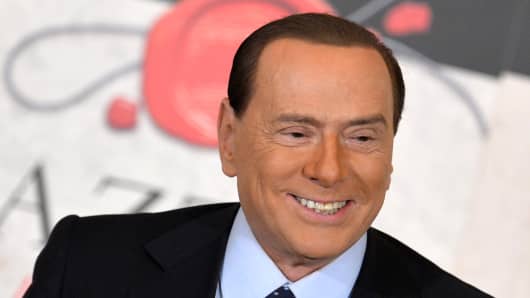Silvio Berlusconi withdrew as candidate for Italy's premiership on Monday as the price of a pact with the devolutionist Northern League that could prevent the formation of a stable government after next month's election.
Berlusconi has been striving for weeks to seal the deal with his estranged former allies to strengthen the center-right bloc, under a strategy to stymie the center-left government that is expected to emerge from the election on Feb. 24-25.
The League had previously refused a pact because of rank-and-file opposition to the scandal-plagued Berlusconi being candidate for prime minister.
The media magnate was driven from office a year ago at the height of Italy's economic crisis after he was charged with having sex with an under-age prostitute.
League leader Roberto Maroni confirmed the coalition pact, telling a news conference it "says explicitly that the candidate for prime minister will not be Silvio Berlusconi".
"Silvio Berlusconiaccepted the request not to stand as prime minister," he said.
Earlier, in an interview on the Italian radio station RTL, Berlusconi had left the issue of the premiership in a future centre-right government open. He said he would prefer to be the economy minister and that most likely Angelino Alfano, secretary of his People of Freedom (PDL) party, would be the prime ministerial candidate.
Berlusconi wanted the alliance with the League to increase his chance of winning enough seats in the upper house, or Senate, to make it hard for the next government to pass laws.
Berlusconi said he would remain head of the PDL and the coalition. "It will be the head of the coalition who would indicate who will be the prime ministerial candidate if we win," said Berlusconi, who had previously insisted he himself would be the candidate.
(Read More: Battle Lines Drawn in Italy's Election)
Maroni said he liked Alfano but the League's own candidate for premier would be Giulio Tremonti, who was economy minister in Berlusconi's last government.
The centre left, led by Pier Luigi Bersani, has been ahead in opinion polls for months. The latest survey, published on Sunday, suggested it would win between 38 and 39 percent.
A PDL-League alliance could pull in about 28 percent of the vote, with a centrist alliance under outgoing premier Mario Monti on 14-15 percent, the poll indicated.
Bersani said the deal between Berlusconi and the League was fully expected but was also "disturbing," considering the damage that he said the alliance between the two parties had done to Italy over the last decade.
Under Italy's much-criticised electoral law, Bersani is expected to win a comfortable majority in the lower house.
Deal
But in the Senate the distribution of seats is decided on a regional basis and the populous northern regions led by Lombardy return more senators.
By allying with the League in its northern strongholds, Berlusconi hopes to be able to destabilise a centre-left government in parliament.
In an interview on television channel La 7, Bersani said Berlusconi and the League were his real adversaries, while Monti was a "competitor" towards whom he intended to be friendly and with whom he would be happy to negotiate after the election.
(Read More: Italy's Likely Next Leader: No Comedian or Cavalier)
Nonetheless, he said Monti's decision to run in the election was "not good news for Italians," and that his creation of a party around his own name, called "With Monti for Italy," was a recipe for instability.
He also dismissed the idea that Monti could return as prime minister unless he won the most votes at the election, a scenario Bersani ruled out.
"We will get a majority both in the Chamber and in the Senate," he said.
The League wants strict controls on immigration and favours giving more autonomy to Italy's 20 regions. It wants more tax revenue to go directly to the regions, saying the rich north is paying for a south it brands as corrupt and economically backward.
Berlusconi said that under the deal the PDL would support the League's Maroni as candidate for president of Lombardy in regional elections.
The former prime minister is awaiting a verdict soon in the trial in which he is accused of paying an underage prostitute. Weakened by the scandal, he was forced out of office and replaced by Monti in November 2011 when Italy tottered on the edge of a Greek-style debt crisis.
He has become notorious for almost daily changes of position, which Monti called "bewildering" when he entered the electoral campaign in December.
Berlusconi's party backed Monti's technocrat government for a year before precipitating its fall by withdrawing support last month.
Berlusconi previously suggested Monti could lead the centre-right but, since the former European Union commissioner sided with centrists, has launched vitriolic daily attacks on him especially for his introduction of a widely hated property tax.
Industry Minister Corrado Passera, frequently touted as a possible election candidate for the centrists before Monti entered the field, on Monday said Monti's electoral platform was too timid.
In an interview with the Corriere della Sera daily, the former head of Italy's biggest bank also said the outgoing premier should not have allied himself with two existing centrist parties.


